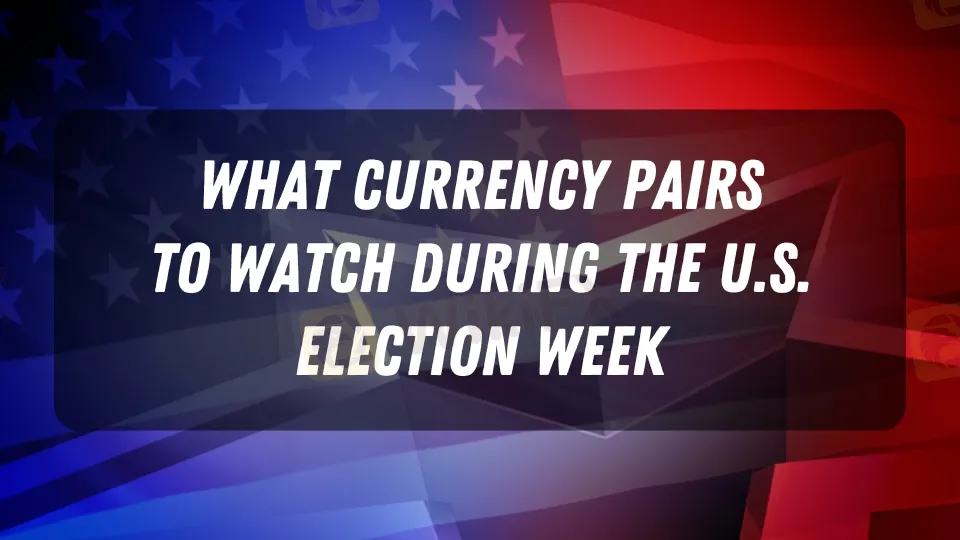简体中文
繁體中文
English
Pусский
日本語
ภาษาไทย
Tiếng Việt
Bahasa Indonesia
Español
हिन्दी
Filippiiniläinen
Français
Deutsch
Português
Türkçe
한국어
العربية
What Currency Pairs to Watch During the U.S. Election Week
Abstract:Track key forex pairs like EUR/USD, USD/JPY, and USD/MXN for insights on volatility and market sentiment during this U.S. election week, November 5, 2024.

As the United States presidential election approaches on November 5, global financial markets prepare for possible turbulence, particularly in the FX market. This week, currency pairings such as EUR/USD, USD/JPY, USD/MXN, USD/CAD, and GBP/USD will be widely followed, as changes in US trade policy and economic predictions may have a substantial influence on these currencies. The tight race between Kamala Harris and Donald Trump has raised market expectations, with each possible conclusion having significant consequences for international trade ties and economic policies.
EUR/USD: Eurozone. Euro vs US Dollar
A Trump win might lead to a stronger US currency because of his likely reinstatement of protectionist measures. Trump has suggested taxes on European and Chinese goods, which may boost the dollar index and put pressure on the euro. These tariffs, together with potential tax cuts, might cause the dollar to rise, straying from the European Central Bank's policy strategy. The Eurozone may also experience economic issues as a consequence of retaliatory tariffs, perhaps forcing the ECB to contemplate rate cuts and causing the euro to fall versus the dollar. This volatility may spread to other currencies related to commodities and developing markets.
USD/JPY: US Dollar vs Japanese Yen
The yen has historically weakened under Democratic regimes while gaining under Republican leadership. However, under Joe Biden's presidency, the yen has depreciated significantly, owing more to rate rises by the United States Federal Reserve than to presidential measures. Election uncertainty has increased market volatility, with forecasts of greater yen movements. The Bank of Japan is expected to change its monetary policy, possibly strengthening the yen, but U.S. labor market fundamentals and changing industrial patterns might have a further impact on the yen's performance once election results emerge.

USD/MXN: US Dollar vs Mexican Peso
Because of Mexico's economic dependence on the United States, the peso is especially sensitive to US election results. Trump's history of protectionist trade policies, including tariffs and the renegotiation of NAFTA to USMCA, implies that if re-elected, he may reinstall or increase taxes on Mexican imports. Increased tariffs might harm Mexico's export-driven economy by raising export prices, decreasing demand, and lowering the value of the peso. The Mexican economy may see greater volatility as investors assess the possible risks and changes in trade policy.
USD/CAD: US Dollar vs Canadian Dollar
Canada, another close economic partner of the United States, may experience the effects of U.S. election results immediately. Pre-election concerns have driven the Canadian dollar to a two-year low versus the US currency. A Trump victory might result in higher taxes on Canadian exports, affecting the country's export-dependent economy, since around 75% of its exports are destined for the United States. Changes in trade barriers may lower the Canadian currency as US policies evolve. Furthermore, since Canada is a significant oil exporter, any changes in US energy policy may have an indirect influence on CAD values via variations in oil prices.
GBP/USD: British Pound vs US Dollar
The pound may be impacted by changes in US policies after the election. If the dollar declines owing to changes in US economic policies, the pound may rise compared to the USD, and vice versa. The result of the US election might shift the market mood toward risk or caution, affecting currencies such as the pound. Anticipated interest rate decreases by the Federal Reserve and the Bank of England may potentially have an influence on the pound via yield differentials and capital flow adjustments, resulting in possible volatility in the GBP/USD pair.
Final Thoughts
With the U.S. election this week, forex traders should keep an eye on these currency pairings, as the results might cause substantial market changes. A Trump victory may result in more protectionist measures that affect several currencies, while a Harris victory may concentrate on wider economic stabilization methods. Observing these pairings offers insight into market mood, allowing traders to make better judgments. As usual, risk management is critical, since election-induced volatility may compound both profits and losses in the currency market.

Disclaimer:
The views in this article only represent the author's personal views, and do not constitute investment advice on this platform. This platform does not guarantee the accuracy, completeness and timeliness of the information in the article, and will not be liable for any loss caused by the use of or reliance on the information in the article.
Read more

Top 10 Trading Indicators Every Forex Trader Should Know
Master the top 10 Forex trading indicators to analyze real-time Forex quotes, trends, and market signals. Learn strategies to boost accuracy and avoid mistakes.

WikiEXPO Global Expert Interview: Simone Martin—— Exploring Financial Regulation Change
In the midst of financial innovation and regulation, WikiGlobal, the organizer of WikiEXPO, stays abreast of industry trends and conducts a series of insightful and distinctive interviews on pivotal topics. We are delighted to have the privilege of inviting Simone Martin for an in-depth conversation this time.

MultiBank Group Wins Big at Traders Fair Hong Kong 2024
Discover how MultiBank Group, a global leader in financial derivatives, secured three prestigious awards at Traders Fair Hong Kong 2024, highlighting its innovative trading solutions and industry excellence.

CySEC Settles Compliance Case with Fxview Operator Charlgate Ltd
Discover how CySEC resolved compliance issues with Charlgate Ltd, the operator of Fxview, through a €50,000 settlement. Explore the investigation, regulatory measures, and CySEC's new website designed for improved accessibility and transparency.
WikiFX Broker
Latest News
Geopolitical Events: What They Are & Their Impact?
Top 10 Trading Indicators Every Forex Trader Should Know
Why Do You Feel Scared During Trade Execution?
Currency Calculator


